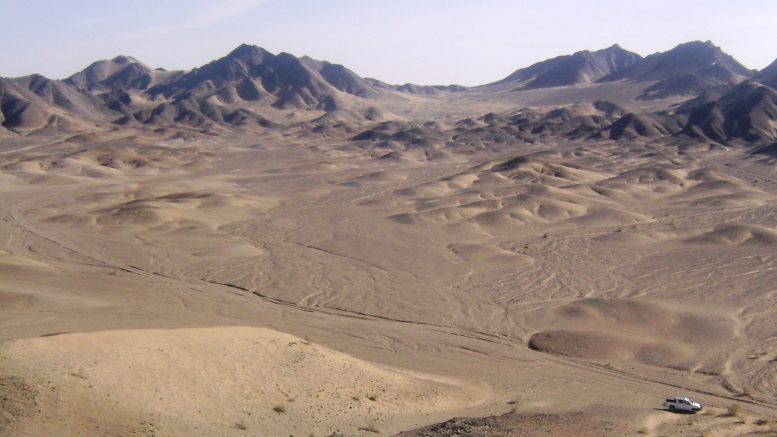Barrick Gold (TSX: ABX; NYSE: GOLD) aims to start producing copper and gold from its Reko Diq project in Pakistan’s Balochistan province in 2027, the company’s CEO Mark Bristow said at a conference call on Tuesday.
The project, which was suspended in 2011 due to a dispute over the legality of its licencing process, is expected to have an initial capital cost of about US$7 billion — according to the latest conceptual design— which is two times the estimate stated in the 2010 feasibility study. It is also expected to have a mine life of 40 years, as opposed to 56.
“If all goes to plan, we expect production in five to six years’ time,” said Bristow.
The company is working to finalize a binding agreement. As part of the closing process, parliaments of both Balochistan and Pakistan will pass a legislation relating to mineral title, fiscal parameters and stability as well as the ability to repatriate invested fund and profits, the CEO added.

Mark Bristow visits geologists at the Kibali mine in the Democratic Republic of Congo. Credit: Barrick Gold.
The process will then be reviewed by the country’s supreme court, which Barrick expects to take place in 2023 or 2024, after which the company expects to complete an updated feasibility study.
In March, Barrick announced that it had reached an agreement, after two years of negotiations, with Pakistan’s government to restart Reko Diq, which hosts one of the world’s largest undeveloped open pit copper-gold porphyry deposits.
Barrick foresees the project as a conventional open pit mine to be constructed in two phases and designed to start with a 40-million-tonne-per-year plant, before rising to 80 million tonnes within five years. The first phase is expected to cost about US$4 billion and the second phase, US$3 billion.
Barrick will own 50% of the project and will retain operational control throughout the life of the project. The government of Balochistan will own 25%, while the rest of the ownership will be divided among three Pakistani-state-owned enterprises.
“To manage the upfront capital cash flows and lower the execution risk, Barrick is seeking project financing partners for phase one,” said Bristow, adding that the second phase is likely to be self-funded.
The investment in Balochistan, an arid desert along the border of Pakistan and Iran, will make the province the largest recipient of foreign investment in the country, according to Barrick. It will create about 4,000 long-term jobs and employ about 7,500 people.
In early April, a group of activists based in Balochistan urged the Pakistan government to make the signed agreement on the Reko Diq project public in order to ensure that the people of Balochistan are “not deprived of their rights” and ignored.
Political turmoil
The country is currently in the midst of political turmoil after its former prime minister Imran Khan, whose government Barrick negotiated the deal with, was ousted from power after losing a no-confidence vote on Apr. 10.
In September 2011, Balochistan’s government said that it considered the mining lease application for the project, which, at the time, Barrick ran along with Chile’s Antofagasta (LSE: ANTO), to be “incomplete and unsatisfactory.”
The mining companies, however, considered the decision unlawful and filed arbitration claims at the World Bank International Centre for Settlement of Investment Disputes (ICSID). In 2019, the ICSID awarded US$5.5 billion in damages to the mining companies with an interest of 1% per annum until the award is paid.
Barrick though will waive the penalty if the project restarts.
“While the project’s development was stalled by legal disputes, its geological quality has never been in doubt,” said Bristow. “It’s one of the best undeveloped copper-gold deposits …that’s why we persevered with our efforts to unlock its enormous potential and after two years of negotiations… we reached an agreement that will benefit all parties.
The Reko Diq deposit is estimated to have a global resource (outlined in 2010 and treated by Barrick as historic) of 5.9 billion tonnes averaging 0.41% copper and 0.22 gram gold per tonne.
Scotiabank analyst Tanya Jakusconek, in a research note to clients, said that the market does not ascribe “much value” to the project as the agreements are yet to be finalized and because Pakistan does not have an established mining sector and is viewed as a “higher-risk jurisdiction.”
“It will require significant capex to develop which has additional risk to cost pressures given the inflationary environment. Given these uncertainties, at this point, we have ascribed no value to Reko Diq,” wrote Jakusconek.
At press time in Toronto, Barrick was trading at $32.17 per share within a 52-week trading range of $22.30 and $33.50. The company has 1.7 billion common shares outstanding for a market cap of $57.2 billion.



Be the first to comment on "Barrick aims to start producing at Pakistan’s Reko Diq in 2027 "